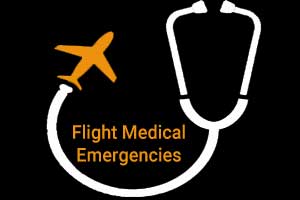- Home
- Editorial
- News
- Practice Guidelines
- Anesthesiology Guidelines
- Cancer Guidelines
- Cardiac Sciences Guidelines
- Critical Care Guidelines
- Dentistry Guidelines
- Dermatology Guidelines
- Diabetes and Endo Guidelines
- Diagnostics Guidelines
- ENT Guidelines
- Featured Practice Guidelines
- Gastroenterology Guidelines
- Geriatrics Guidelines
- Medicine Guidelines
- Nephrology Guidelines
- Neurosciences Guidelines
- Obs and Gynae Guidelines
- Ophthalmology Guidelines
- Orthopaedics Guidelines
- Paediatrics Guidelines
- Psychiatry Guidelines
- Pulmonology Guidelines
- Radiology Guidelines
- Surgery Guidelines
- Urology Guidelines
Recommendations for in-flight medical emergencies for physicians

In an article in CMAJ (Canadian Medical Association Journal) practical tips for physicians on airplanes in a medical emergency have been provided.While on board if a health professional is asked for his expert opinion to manage an emergency, it may suddenly be challenging being in an unfamiliar, foreign and limited environment without knowledge of the available resources.Therefore physicians at St. Michael's Hospital have developed practical recommendations for in-flight medical emergencies for healthcare professionals.
More and more people are travelling by plane each year, with approximately 2.75 billion passengers flying on commercial airlines annually, according to the authors. In Canada, there were 133.4 million airline passengers in 2015, a 27 per cent increase from 2009, they said.
This increase in patient traffic, along with longer flights that increase the stress of flying on the body and a greater proportion of older passengers and those with pre-existing medical conditions, have led to an increase in in-flight medical emergencies in recent years, according to the authors.
"Every health-care professional is likely to hear this call at some point while flying, but for most of us, treating patients on a plane is a completely unfamiliar scenario," said Dr. Alun Ackery, an emergency physician at St. Michael's Hospital and senior author of the recommendations. "We wanted to provide a better understanding of what to expect and how to respond if you're called to assist in one of these emergencies."
The recommendations, developed in collaboration with Air Canada and WestJet, provide an overview of the available medical equipment, the environmental challenges of treating patients on a plane, the airlines' policies and procedures as well as the legal and ethical duties of physicians to respond to a call for assistance.
Every plane with at least 100 passenger seats is legally required to carry a medical kit, according to Transport Canada. Although Transport Canada also outlines the minimal requirements the medical kit must contain, individual airlines have the flexibility to enhance the contents as they see fit, the authors said.
In a video accompanying the recommendations, the authors unpacked Air Canada's medical kit to help health-care professionals further understand what resources will be available during an in-flight emergency.
"Each airline's kit is going to look different, and the contents aren't always going to be familiar, which adds another layer of complexity to an already stressful situation," said Dr. David Kodama, an emergency resident at the University of Toronto and lead author of the recommendations.
In Canada, Quebec is the only province that imposes a legal duty on physicians to come to the assistance of a person in a life-threatening emergency, the authors said. All jurisdictions, however, have legislation that protects physicians who voluntarily provide emergency medical assistance at the scene of an accident or in an emergency, they said.
The Canadian Medical Association and the Canadian Medical Protective Association both suggest physicians have an ethical obligation to provide their best assistance during an emergency, according to the authors.
"We recognize that hearing the call go out for a physician on board a flight can be unexpected, but we do have an obligation to respond," said Dr. Ackery. "We hope these recommendations will provide healthcare professionals with enough knowledge to make that call a little bit less anxiety-provoking in the future."

Disclaimer: This site is primarily intended for healthcare professionals. Any content/information on this website does not replace the advice of medical and/or health professionals and should not be construed as medical/diagnostic advice/endorsement or prescription. Use of this site is subject to our terms of use, privacy policy, advertisement policy. © 2020 Minerva Medical Treatment Pvt Ltd